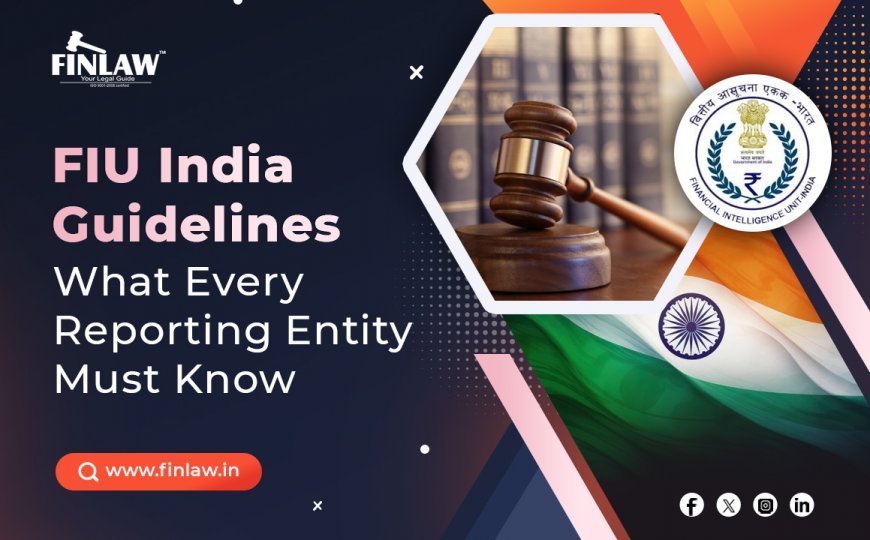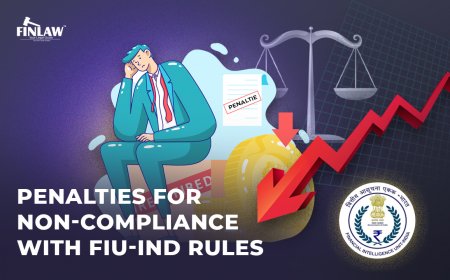FIU India Guidelines: What Every Reporting Entity Must Know
Detailed guide to FIU guidelines in India. Learn what every reporting entity must know to avoid penalties and strengthen AML efforts.

In an era where financial crimes are becoming increasingly sophisticated, the role of the Financial Intelligence Unit – India (FIU-IND) is paramount in safeguarding the integrity of the country's financial system. Established under the Prevention of Money Laundering Act (PMLA), 2002, FIU-IND serves as the central agency responsible for receiving, processing, analyzing, and disseminating information related to suspicious financial transactions. For businesses operating within India's financial ecosystem, understanding and complying with FIU guidelines is not just a regulatory requirement but a critical component of ethical and secure operations.
What Are FIU Guidelines?
The FIU guidelines in India are a set of comprehensive regulatory instructions issued by FIU-IND to various types of reporting entities under the PMLA. These guidelines are intended to ensure uniformity in the reporting, monitoring, and prevention of suspicious transactions that may be linked to money laundering or terrorist financing. FIU guidelines outline how reporting entities must handle customer due diligence, record maintenance, transaction reporting, and internal controls to combat financial crime.
Understanding FIU-IND and Its Mandate
FIU-IND was established by the Government of India in 2004 as an independent body reporting directly to the Economic Intelligence Council headed by the Finance Minister. Its primary functions include:
-
Collection of Financial Information: Receiving reports such as Cash Transaction Reports (CTRs), Suspicious Transaction Reports (STRs), and others from various reporting entities.
-
Analysis of Financial Data: Processing and analyzing the collected data to identify potential instances of money laundering and related financial crimes.
-
Dissemination of Intelligence: Sharing relevant information with law enforcement and regulatory agencies to facilitate further investigation and action.
-
Coordination and Strengthening Efforts: Collaborating with national and international agencies to bolster the fight against money laundering and terrorist financing.
Who Qualifies as a Reporting Entity?
Under the PMLA, the following are designated as reporting entities:
-
Banking Companies: All banks operating in India, including cooperative banks.
-
Financial Institutions: Entities such as non-banking financial companies (NBFCs), housing finance companies, and others engaged in financial activities.
-
Intermediaries: Stockbrokers, sub-brokers, share transfer agents, and other entities registered under the Securities and Exchange Board of India (SEBI).
-
Persons Carrying on Designated Business or Profession (PCDBP): This includes real estate agents, dealers in precious metals and stones, and now, Virtual Digital Asset Service Providers (VDA SPs) following recent amendments.
Key Obligations for Reporting Entities Under FIU Guidelines in India
1. Client Due Diligence (CDD)
Reporting entities are mandated to perform thorough due diligence on their clients. This involves:
-
Identification and Verification: Confirming the identity of clients using reliable, independent source documents, data, or information.
-
Understanding the Nature of Business: Gaining insights into the purpose and intended nature of the business relationship.
-
Beneficial Ownership: Determining whether a client is acting on behalf of a beneficial owner and taking reasonable measures to verify the identity of such persons.
These measures are crucial at the commencement of an account-based relationship and during periodic reviews.
2. Record Maintenance
Entities must maintain records of all transactions, both domestic and international, for a minimum of five years. This includes details of:
-
Nature of Transactions: Type and purpose of the transaction.
-
Amount and Currency: Exact figures and the currency involved.
-
Date and Parties Involved: When the transaction occurred and who was involved.
Such meticulous record-keeping ensures transparency and aids in any subsequent investigations.
3. Reporting Requirements
Timely reporting to FIU-IND is a critical obligation. The types of reports include:
-
Cash Transaction Reports (CTRs): For cash transactions exceeding ₹10 lakhs in a month.
-
Suspicious Transaction Reports (STRs): For transactions that raise suspicions of money laundering or related offenses.
-
Non-Profit Organization Transaction Reports (NTRs): For transactions involving non-profit organizations.
-
Counterfeit Currency Reports (CCRs): For instances involving counterfeit currency.
-
Cross Border Wire Transfer Reports (CBWTRs): For international wire transfers exceeding ₹5 lakhs.
CTRs and NTRs must be filed by the 15th of the succeeding month, while STRs should be reported within seven working days of identifying a suspicious transaction.
4. Appointment of Key Officers
Every reporting entity is required to appoint:
-
Principal Officer: Responsible for ensuring compliance with PMLA provisions and for reporting transactions to FIU-IND.
-
Designated Director: A senior-level officer responsible for overall compliance with the obligations under the PMLA.
The names, designations, and contact details of these officers must be communicated to FIU-IND.
5. Risk-Based Approach and Internal Controls
As per updated FIU guidelines in India, entities must implement a risk-based approach (RBA) to monitor client activity. This includes:
-
Categorizing clients based on their risk profile.
-
Performing enhanced due diligence for high-risk customers, such as politically exposed persons (PEPs).
-
Conducting regular internal audits to evaluate compliance.
Registration Process with FIU-IND
To commence operations as a reporting entity, registration with FIU-IND is mandatory. The process involves:
-
Preparation: Ensuring compliance with all applicable requirements under the PMLA, PML Rules, and AML-CFT guidelines.
-
Documentation: Gathering necessary documents, including details of the Principal Officer and Designated Director, AML/CFT policies, and other relevant information.
-
Online Application: Submitting the application through the official FIU-IND portal, FINGate 2.0.
-
Verification and Approval: FIU-IND reviews the application, may request additional information, and upon satisfaction, approves the registration.
Penalties for Non-Compliance
Failure to adhere to the FIU guidelines in India can result in severe penalties, including:
-
Monetary Fines: The adjudicating authority may impose fines ranging from ₹10,000 to ₹1 lakh per failure.
-
Suspension of Licenses: Regulatory bodies may suspend or revoke licenses for non-compliant entities.
-
Reputational Damage: Entities publicly named in non-compliance notices risk losing client trust and business relationships.
Recent Developments in FIU Guidelines
As the financial landscape evolves, so do the FIU guidelines. Key recent updates include:
-
Inclusion of Virtual Digital Asset Service Providers (VDASPs): FIU-IND now requires crypto exchanges and wallet providers to register and report transactions.
-
Heightened Scrutiny on Real Estate Transactions: More stringent norms for property developers and agents.
-
Collaboration with Global FIUs: India is increasingly engaging in cross-border data sharing to track illicit funds.
-
Enhanced Use of Technology: FIU-IND encourages adoption of RegTech and AI/ML-based transaction monitoring systems.
Best Practices for Compliance with FIU Guidelines
To ensure full compliance, reporting entities in India should adopt the following best practices:
-
Regularly train compliance and frontline staff on anti-money laundering (AML) obligations.
-
Implement automated monitoring tools to flag suspicious activities.
-
Periodically review and update internal policies to reflect regulatory changes.
-
Maintain secure and accessible documentation for audits or investigations.
-
Conduct regular risk assessments and update customer risk profiles accordingly.
-
Participate in industry workshops and seminars conducted by FIU-IND or other regulatory bodies.
Final Thoughts
In today’s regulatory environment, compliance with FIU guidelines in India is not optional—it is a legal imperative. For reporting entities in India, failure to meet these obligations can result in serious legal and reputational consequences. By staying updated with the latest directives from FIU-IND and embedding robust internal controls, businesses can not only remain compliant but also contribute to the broader national effort against financial crime.
Whether you are a bank, NBFC, real estate agent, or a crypto exchange, aligning with FIU guidelines in India ensures your operations remain transparent, credible, and secure.
Frequently Asked Questions (FAQs)
Q1: What are FIU guidelines? A: FIU guidelines are regulatory instructions from the Financial Intelligence Unit – India that outline how reporting entities must manage AML/CFT compliance.
Q2: Who needs to register with FIU-IND? A: All reporting entities under PMLA, including banks, NBFCs, SEBI intermediaries, and virtual asset service providers.
Q3: What is the penalty for non-compliance? A: Penalties range from ₹10,000 to ₹1 lakh per violation, and entities may face license suspension or public reprimand.
Q4: What is an STR under FIU guidelines? A: A Suspicious Transaction Report (STR) is submitted when a transaction raises red flags related to money laundering or terrorism financing.
Q5: Where can I register as a reporting entity? A: Registration must be done through the FINGate 2.0 portal of FIU-IND.
For the latest updates and regulatory changes, always refer to the official FIU-IND website.
What's Your Reaction?



















